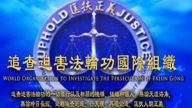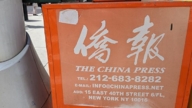【新唐人2011年4月26日讯】大陆连日来的罢工,媒体封锁消息、中共当局不肯证实,而人力资源和社会保障部副部长杨志明却在最近提出,要实现职工工资每年增长15%,在“十二五”期间力争实现翻番的目标。工资翻番本来应该是大快人心的好事,但民众却表示怀疑。让我们来看看究竟是怎么回事?
“工资要翻番”这个消息一传出,立即引发网民热议。《北京日报》的消息说,有网路投票显示,93%的参与调查者表示对这个“宏伟目标”毫无信心。
伍凡指出,提高工资,增加消费能力,或许可以抑制通货膨胀,但同时也会带来通货膨胀。中共当局提高工资是为了稳定人心。
伍凡《中国事务》主编:“提高工资,是一个给人开的支票,最后能不能实现,谁也不知道。5年以后的事情,5年以后共产党在不在都不知道。而且(中共)要安定国内的局势。现在国内局势非常非常紧张,老百姓怨声载道,抗议物价太高。”
网民还记得,曾在去年,人保部劳动工资研究所所长苏海南就说过类似的话,上一次用的是“收入倍增”,而这一次则是“工资翻番”。但是结局都一样,都被民众和各路媒体群起而“哄”之。知名经济评论人士草庵居士认为,中共人社部提出增长职工工资,五年翻番的口号,实际上只是弥补劳动工资占GDP比重过低的旧账。
草庵居士:“中国经济发展几十年当中,劳动者工资比例占GDP的比值当中是一直非常低的,近20年来,降到了8-12%之间。随着经济的发展,工资比例在GDP的比例中应该逐渐提高的,在美国比例在55%左右,在其他(发达)国家也占45-55%之间,即使在发展中国家像印度、南非也都在40%以上。这表明了劳动者工资收入要占GDP中相当的比例是反映社会财富分配的问题。"
《北京日报》的评论说,民众担心,这次涨工资的所谓“春风”,是否又只在少数国企垄断行业、政府部门或者少数人的院墙里吹,成了少数群体在高基数上翻番,最终拉动全民翻番的数字游戏。
最近,互联网曝出,贵州的国有大型企业黎阳航空发动机公司职工,不满公司出台的工资分配方案,从4月15号以来一直罢工。据网友发帖说,黎阳航空发动机公司的工人岗位工资是600-1730元,而领导的岗位工资最高6300多。
草庵居士:“如果以目前这种没有法律及公平制度的制约的状况下,片面增加工资容易造成国营企业职工和官方公务员的工资大幅增长,而百姓的私营企业的工资没有得到实质的增长。”
同时,在目前通胀压力下,民众也质疑工资增长给老百姓带来的实际效果。去年11月,全国人大财经委副主任吴晓灵承认,过去30年,中国是以超量的货币供给推动了经济的快速发展,而超发的货币高达近43万亿。而给职工加工资,意味着企业增加生产成本,对中国的中小型企业来说,无疑是雪上加霜。
伍凡:“(中国)最没有钱的就是中小型企业的实体经济,贷不到款,赚不到钱,你还要他增加工资,那就是叫他增加成本。成本提高后怎么办呀,你一定要产品价格提高才能卖的出去,但卖出去就更少。那最终他们就关门了,我不干了。”
据大陆媒体报导,1月份闭幕的108届广交会,受工人工资、原材料成本上涨等因素影响,有些企业无奈“退订单”。
新唐人记者王子琦、柏妮、特约记者高紫檀采访报导。
No Confidence In “Doubling Wages”
Recent strikes in China are blocked by the media.
The Chinese authorities also refused to confirm this.
However, China’s Ministry of Human Resources
and Social Security (HRSS) deputy minister,
Yang Zhiming recently brought up the goal
of doubling wages in the “12th Five-Year Plan,"
with 15% annual wage growth.
But Chinese people respond to it only with doubts.
The news on “Doubling Wages” has caused
heated discussions among netiznes.
Beijing Daily reported an online survey shows
that 93% of the people have no confidence
at all in this “grand objective.”
Chief Editor of China Affairs Wu Fan pointed out,
that increasing wages to rise spending power
might control inflation; it could also cause inflation.
The Chinese authorities want to reassure the public
by raising wages.
Wu Fan (Editor-In-Chief, China Affairs):
“Raising wages is like writing a check. No one knows
whether it can be cashed or not.
Even the Chinese Communist Party (CCP)
does not know what will happen in 5 years.
CCP wants to stabilize the domestic situation,
which is very intense. People are complaining
and are protesting against high prices."
Netizens still recall HRSS’s Labor Wage Institute
leader Su Hanan making similar statement last year
about “increasing income several times." The two
slogans were received in the same way by the public.
Renowned economist-commentator Cao-an thinks
that CCP’s slogan on wages increase is to cover up
the fact that people’s wage account
for just a small percentage of the GDP.
Cao-an: “Wages accounted for a very small part
of the GDP during the last few decades
of China’s development. In the last 20 years,
it dropped to 8-12%. Wages should gradually grow
with the economic development.
They account for 55% of U.S. GDP,
45-50% in other developed countries and over 40%
in developing countries like India and South Africa.
This reflects distribution of workers’ wealth.”
Beijing Daily commented that people are concerned
this “spring air” would only reach a small number
of state-owned enterprises and government agencies,
so the overall wage doubling would be caused
by the wage doubling of a small, highly-paid group.
Recently the internet revealed workers of Guizhou’s
state-owned enterprise Liyang Aero Engine Corp.
went on strike since April 15 due to amiss wages.
According to netizens, workers’ wages range
between RMB600-1730 a month, while leaders
are paid as high as RMB6,300 a month.
Cao-an: “Without legal constraints or a fair system,
wages increase might only benefit state-owned
enterprises and civil servants, but wages
for private business workers and migrant workers
will not increase. “
Meanwhile, with the current pressure on inflation,
people question the real impact of wage increase.
In November 2010, the National People’s Congress
Economy and Finance Committee vice chairman
Wu Xiaoxia admitted, that in the past 30 years,
China promoted economic acceleration
with money oversupply, which is ca. RMB43 trillion.
Wages increase also means increase of business costs.
This will make things more difficult
for the midddle and small size businesses.
Wu Fan: “Midddle and small enterprises (in China)
are the poorest. They do not earn much money,
but they get the pressure to increase wages,
hence the cost. What can they do with cost increase?
They must increase the price, then sales are affected.
Eventually they close down.”
According to Mainland media reports, at the 108th
China Import and Export Trade Fair in Guangzhou,
which concluded in January, some enterprises
got their customers’ orders canceled due to wage
and raw material costs increase, and other factors.
NTD reporters Wang Ziqi, Bai Ni and Gao Zitan





























